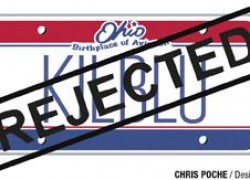
As the Ohio State-Michigan football game approaches, one place that Ohio drivers’ anti-Michigan sentiments can’t be shared is on their license plates.
The Ohio Bureau of Motor Vehicles has rejected specialized license plate requests expressing hatred toward Michigan.
The BMV has a special plates reviewing committee that meets every morning to review the combination requests for personalized license plates submitted the day before, said Lindsey Bohrer the BMV spokeswoman. Approved plates go on to be printed, and when a plate is rejected a notice is sent to the requester.
“What they do is they look at a variety of sources, there’s a variety of ages to the people on the committee, a variety of positions just so we can get all angles of the staffing and BMV,” Bohrer said. “So what we do is, those people look at the different combinations, they go onto different sites, they go onto urban slang, urban dictionary they go onto different language sites, just so that we can make sure that none are inappropriate.”
There is an appeals process if someone feels they should be able to have the license plate, Bohrer said. The appeal can be sent to the registrar who will review the plate and have a final say on whether the plate will be approved.
The BMV has an agreement with the American Civil Liberties Union as to what plates can be approved.
“We like to stay on a good balance between freedom of speech, but also limiting things that are profanity and things like that,” Bohrer said.
Bohrer said the agreement has three major parts: They would reject requests containing words, combinations or phrases that are so profane such as swear words or sexually explicit plates; combinations that are so offensive they could reasonably be expected to provoke a violent response are prohibited; and word combinations and phrases that advocate immediate lawlessness are prohibited.
The ACLU of Ohio first got involved at least 10 years ago after being tipped off by a story from The Columbus Dispatch, said Gary Daniels the associate director for the ACLU of Ohio. The agreement the BMV has with the ACLU of Ohio came out after the ACLU of Ohio sued the BMV after finding a client whose plates had been ultimately rejected.
When the BMV agreed to let its client have his plates and through settlement discussions came up with the guidelines, Daniels said.
“Under the settlement, they still have the power to reject or authorize certain plates, but I think it’s clear that they are still going overboard with regard to what it is that they are censoring,” Daniels said.
The issue goes to the basics of first amendment and free speech law and when the government opens a forum for free speech in public settings like a town hall or public square, Daniels said.
“You can’t have the government in the business of picking winners and losers when it comes to exercise of free speech, it’s very much the same way it is here with the license plates. The government has opened up a forum for speech, and I don’t doubt that there are some things that they can censor and that courts wouldn’t care about that, they would see that as constitutional,” Daniels said.
While the ACLU of Ohio has not done any follow-up investigations yet, they would be interested in hearing from anyone whose license plates have been rejected and they would investigate further from that point, Daniels said.
Some plates that have been rejected included “HATEMI,” “KILBLU” and “UMH8ER,” The Columbus Dispatch reported.
“We want people to be able to express themselves through the personalized plates, but also, we don’t want profanity or anything obscene to be out there as well, so we just try to be fair and balanced with our plates,” Bohrer said.
“The ACLU’s opinion is you open up that forum, pretty much anything goes. I mean we understand if somehow the text on a license plate could be considered obscenity, a court’s not going to allow that,” Daniels said. “Profanity is not obscenity, profanity is still protected speech under the first amendment and here we have the government … the BMV, and they’re censoring speech.
“With vanity plates, many times the government sees it as ‘Well, people might interpret it as being speech of the state because it’s a license plate.’ But, I think pretty much everybody out there understands that if you see text or numbers on a license plate that isn’t kind of standard like a lot of us have, just a combination of letters and numbers, but instead, it spells something or signifies something. … That that is because the driver of the car, or the owner of the license plates, arranged to have it that way,” Daniels said.
The BMV bans things like profanity, but these seem a little excessive when expressing pride in your school, said Andrew North, a fourth-year in electric engineering.
North said it takes censorship too far. He said it’s meant to stop things like profanity and threats, not trash talk.
“It’s a good thing if it’s like directly targeting somebody specific or if it’s deemed hurtful to somebody,” said Brooke Seidenschmidt, a second-year in exploration.
Seidenschmidt said that if it’s not harmful it shouldn’t be censored,
“It’s kind of a violation of the first amendment,” said Morgan Rivera, a second-year in public affairs. “If people want to express their hatred toward Michigan they should be able to.”
